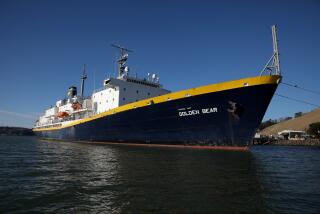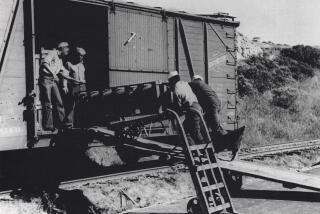Alleged Drug Sales From Navy Frigate Investigated
- Share via
Nine sailors from a Long Beach-based guided missile frigate, including the vessel’s top law enforcement officer, are being investigated by the Navy for various drug related offenses, including allegedly running a drug distribution network and tampering with mandatory urinalysis tests, a Navy spokesman said Saturday.
The Navy is expected to bring charges against some or all of the sailors as early as this week, according to Lt. Cmdr. Steve Chesser, a spokesman for Rear Adm. Alvar Gomez, commander of the Long Beach Naval Station.
The allegations include the use and distribution of marijuana and crystal-methamphetamine (commonly known as ice) both on and off the frigate John A. Moore, Chesser said.
He declined to specify how many of the sailors were involved in each of the alleged offenses. The Navy would not release the names of any sailors involved in the investigation.
Seven sailors, including the ship’s master-at-arms or “head policeman”, have been restricted to barracks at the Terminal Island installation since March 15, when special investigators concluded the seven-month undercover portion of the operation, he said.
Two sailors have been allowed to remain aboard the frigate, which has escorted oil tankers in the Persian Gulf and now serves as a naval reserve training ship. Navy investigators have interviewed at least 18 of the ship’s 160 crew members during the last three weeks, and there may be additional suspects, Chesser said.
“The Navy certainly regards this as serious,” Chesser said. “When we become aware of something like this, we take vigorous action to correct it.”
Chesser said allegations involving drug use on Navy ships in Long Beach have dropped dramatically since the early 1980s, when the Navy began conducting random drug tests on all of its vessels. He said, however, the military remains keenly aware that problems persist.
The investigation of sailors on the John A. Moore was launched by the ship’s commanding officer, Cmdr. William Hickman, and involved the Naval Investigative Service, the civilian detective arm of the Navy, Chesser said. Hickman was out of town and could not be reached for comment.
Chesser would not provide details of the investigation, but he said some of the sailors are suspected of swapping urine samples “that might not be clean” for drug-free samples. The Navy tests its sailors randomly about three times a year for the use of six drugs, including the two drugs allegedly used by some of the sailors.
Chesser said at least one witness is present when sailors give urine samples, and various other regulations are supposed to be followed to ensure samples are not altered. Among the sailors suspected of tampering with the tests on the Long Beach frigate, he said, is the ship’s master-at-arms, whose duties included supervising the testing program.
The investigation has forced the Navy to cancel at least one weekend mission at sea.
Hickman, the ship’s commander, determined last month that it was unsafe to take the frigate from the naval station for a scheduled training mission because of the missing sailors, Chesser said. A substitute training session was held at the pier, he said.
More to Read
Sign up for Essential California
The most important California stories and recommendations in your inbox every morning.
You may occasionally receive promotional content from the Los Angeles Times.













